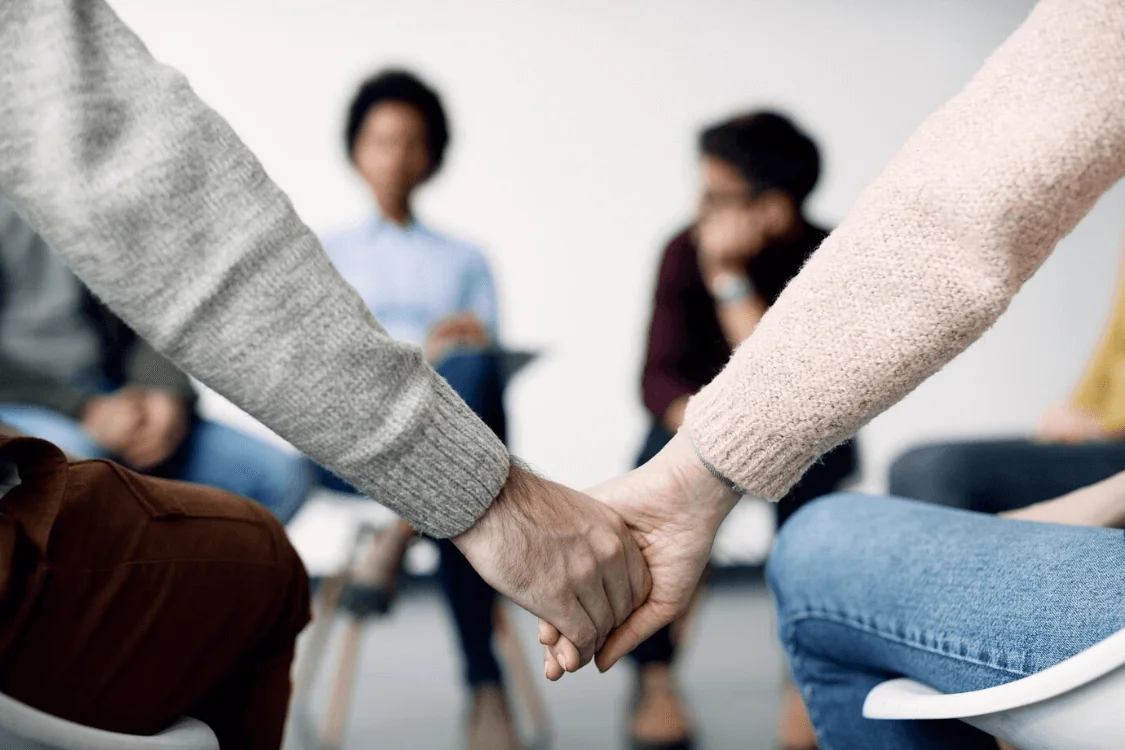
Group Therapy
Group therapy, often known as group psychotherapy, is a form of treatment where individuals share common mental health issues or life challenges and work on them within a group setting under the guidance of one or more therapists.
Twilight Recovery Center recognizes group therapy’s profound impact on personal healing and interpersonal growth, integrating this modality as a cornerstone of its diverse treatment offerings.

What is Group Psychotherapy?

Group psychotherapy involves one or more therapists working with several people simultaneously. It is distinguished by fostering a supportive environment where participants benefit from the communal experience, gain insights through direct therapist feedback, and observe and interact with peers in the group.

Different Types of Group Therapy
Twilight Recovery Center has many types of group therapy, ensuring all participants find a modality that suits their needs for recovery and personal growth. Here’s a closer look at the services our group therapists offer:
- Cognitive Behavioral Therapy (CBT) Groups: These groups are structured around the principles of CBT. They aim to modify negative thoughts and behaviors by introducing practical, skills-based interventions. Participants learn to challenge and replace their unhelpful thought patterns with more beneficial ones, which can lead to improved emotional regulation and behavior changes.
- Dialectical Behavior Therapy (DBT) Groups: These highly structured groups are designed specifically for individuals who experience significant emotional and relational turmoil. They teach mindfulness, emotional regulation, distress tolerance, and interpersonal effectiveness skills, helping members manage intense emotions and enhance their relationship skills.
- Support groups: Providing a platform for sharing experiences and offering mutual support, these groups facilitate a sense of community and understanding among members. They are particularly beneficial for those who might feel isolated in their struggles, as sharing with others facing similar challenges can be profoundly reassuring.
- Psychoeducational groups: These groups serve an educational purpose. A therapist or a counselor provides information about specific psychological or health issues. Members learn about symptoms, treatments, and strategies to cope with their conditions, which empowers them to handle their symptoms more effectively.
Each type of group therapy may vary in structure, from open groups that welcome new members at any time, enhancing the diversity of experiences, to closed groups that move through the therapeutic process together, fostering a deep sense of trust and cohesiveness.
Benefits of Group Therapy
Going to therapy in groups usually offers a wealth of benefits. Here’s how participants benefit from the diverse group therapy programs available:
Shared experiences
Participants often find solace in discovering they are not alone in their struggles. The shared experience of group therapy helps reduce feelings of isolation and fosters a sense of community.
Diverse perspectives
Being part of a group allows individuals to see different ways of handling similar problems. This can be incredibly enlightening and provides a range of strategies one might not consider in individual therapy.
Improved social skills
Interacting in a therapeutic group setting helps participants enhance their interpersonal skills. This improvement often translates into better relationships outside of therapy.
Support and encouragement
The group setting creates an environment of support and motivation. Seeing others progress and overcome their issues is a powerful motivator and reassurance that change is possible.
Role modeling
Participants can emulate the successful strategies and behaviors of their peers managing similar issues effectively. This modeling can instill hope and provide a pathway to recovery.
Economic efficiency
Group therapy is cost-effective. It allows participants to receive therapeutic benefits at a lower cost than individual therapy, making it accessible to more people.
Insights on social dynamics
Group therapy gives the therapist a live context to view how participants interact with others, providing valuable insights used to tailor feedback and advice.
Diversity of experience
Groups often include individuals from various backgrounds, which enriches the therapy experience and helps participants gain multiple perspectives on life’s challenges.

Twilight Recovery Center ensures that its group therapy programs are tailored to meet the specific needs of its participants, using various therapeutic models to maximize the benefits for each group member.
Who Are Therapeutic Groups For?
Our group therapy sessions offer a unique environment where individuals can benefit from peer support and shared experiences, making it an effective complement to individual therapy.
Group therapy is particularly helpful for those who might feel isolated in their struggles. It creates a sense of community and belonging, allowing participants to interact with others facing similar challenges. This form of therapy is beneficial for:
- Individuals recovering from addiction: Group sessions can offer vital support systems and coping strategies shared among peers.
- People experiencing major life changes: Whether it’s dealing with divorce, grief, or transition, group therapy provides a supportive space to discuss these issues.
- Those dealing with mental health conditions: Conditions like anxiety and depression are often discussed in group therapy, providing participants with multiple perspectives and coping mechanisms.
- Anyone seeking personal growth and improved communication skills: The group setting enhances social skills and provides a platform for personal development.


The Role of Certified Group Therapy in Treatment
Group therapy provides critical insights and interpersonal feedback, enriching the therapeutic journey and supporting sustained recovery. Group therapy allows individuals to explore personal issues in a safe, supportive environment, fostering healing through shared experiences and mutual support. It is especially beneficial for those who might feel isolated in their challenges, as it helps to see others facing similar issues, which can be profoundly reassuring and motivating.
What Does A Typical Group Therapy Session Look Like?
Group therapy sessions at Twilight Recovery are structured to maximize therapeutic benefits. Each session typically lasts one to two hours weekly, facilitating ongoing support and progress.
Sessions begin with introductions or updates, allowing members to share their progress and challenges. This helps build a supportive network among the members and reinforces a sense of community.
The therapist guides the discussion, focusing on themes relevant to the group’s needs, such as coping strategies for anxiety, managing substance abuse, or improving interpersonal relationships. Activities may vary, including:
Icebreakers to build comfort and familiarity within the group.
Expressive activities like writing or role-playing to explore and articulate feelings.
Goal-setting exercises to encourage personal growth and practical application of therapy insights.
Therapists at Twilight Recovery employ a mix of structured activities and open discussions, depending on the group’s dynamics and the therapeutic goals.
What Conditions Can Group Therapy Be Used to Treat?
At Twilight Recovery, group therapy is used to address a broad spectrum of conditions, enhancing the recovery journey for those battling various challenges.

Substance Abuse
This includes dependencies on substances such as alcohol, opioids, benzodiazepines, marijuana, methamphetamine, cocaine, heroin, fentanyl, LSD, Xanax, and other prescription or synthetic drugs.

Mental Health Disorders
Group therapy aids in the treatment of depression, anxiety, PTSD, burnout, mood disorders, schizophrenia, and borderline personality disorder, among others.

Process Addictions
These include behavioral compulsions like gambling, shopping, gaming, internet use, and issues related to social media, sex, and pornography.

Eating Disorders
Group sessions also support the treatment of binge eating disorder, anorexia, bulimia, ARFID (Avoidant/Restrictive Food Intake Disorder), and other specified feeding or eating disorders.
Group therapy at Twilight Recovery fosters personal growth and recovery and cultivates a sense of community among participants, making it an integral part of the treatment spectrum for those seeking to overcome their struggles and achieve sustained well-being.
Activities in Group Therapy
At Twilight Recovery, group therapy is used to address a broad spectrum of conditions, enhancing the recovery journey for those battling various challenges.
Role-playing
Participants simulate real-life situations to practice responses and navigate complex interpersonal dynamics.
Skill-building exercises
These may include communication drills, stress management techniques, or problem-solving tasks that promote mental resilience.
Creative expression
Utilizing arts such as painting, music, or drama to express emotions and reduce stress.
Physical team activities
From group sports like basketball or tennis to yoga and hiking, these activities encourage cooperation and are often used to improve physical and mental well-being.
Discussion groups
Focused talks about daily challenges and successes that encourage sharing and provide mutual support.
Relaxation and mindfulness exercises
These include guided imagery, meditation, or breathing exercises, which can help calm the mind and sharpen focus.
Therapeutic outings
Group outings to local museums, scenic walking trails, or community events that help integrate social interactions with therapeutic goals.
Cooking classes and nutritional education
To promote wellness and self-care through healthy eating.
Massage and acupuncture
For relaxation and managing physical symptoms of stress and anxiety.
Water activities and horseback riding
To expand the therapeutic experience and foster a sense of adventure and freedom.

These activities are not only enjoyable but are also critical components of the treatment process, helping participants build trust with each other, develop healthy coping mechanisms, and reinforce the therapeutic gains made during sessions.
How to Prepare Before Finding Group Therapy
To optimally prepare for a group therapy session, it’s essential to approach each meeting with an open mind and a readiness to both share and absorb experiences.
Preparation begins with setting clear personal boundaries and identifying specific goals, which helps participants fully engage with the therapeutic process and derive the most benefit from each session. Here are a few steps to prepare effectively for group therapy:
- Understand group dynamics: Familiarize yourself with the size of the group, the issues it addresses, and the group’s structure—whether it’s open (allowing new members at any time) or closed (all members start and finish at the same time).
- Set personal goals: Even if you’re unsure of your precise objectives, consider what changes or improvements you hope to achieve through therapy.
- Know what to expect: Discuss with the therapist or group leader what the sessions will involve, what is expected of you during the sessions, and the rules regarding confidentiality.
- Plan your contributions: Consider what aspects of your experience you are comfortable sharing. Writing down thoughts or topics you wish to discuss can help make the process smoother and less daunting.

Join a Group and Recover as a Team
At Twilight Recovery Center, group therapy is a journey taken together, where healing is not just an individual quest but a collective endeavor.
By joining a group, participants commit to supporting not only their recovery but also the recovery of their peers, fostering a powerful network of support and accountability.
Contact us to find a group treatment that suits your needs.


